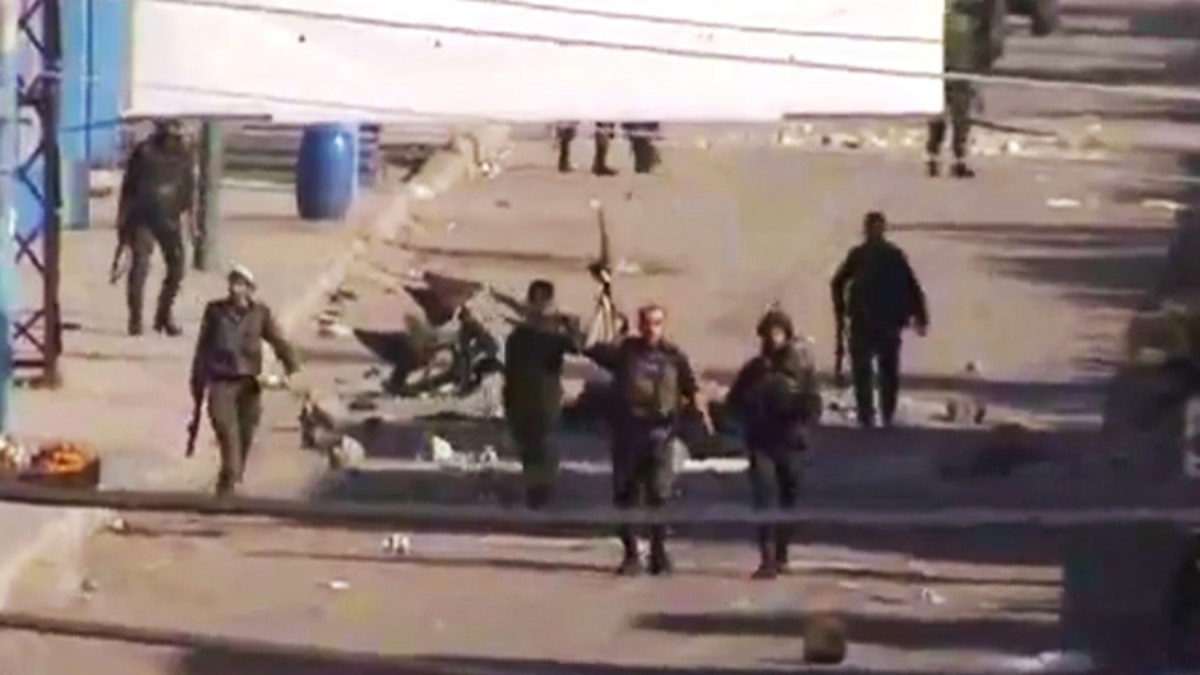
DEC. 19: In this image from TV shown on the internet made available by the Sham News Network, is believed to be soldiers walking down the street in Daraa, Syria. (AP2011)
BEIRUT – Syrian troops assaulting a northwest town with machine gun fire and shelling have killed at least 100 people in one of the deadliest episodes of the 9-month-old uprising against President Bashar Assad's regime, activists said Wednesday.
Tuesday's attack on the town of Kfar Owaid in Idlib province showed the Syrian government was pressing ahead with its crackdown despite its agreement this week to an Arab League plan for bringing a halt to the bloodshed.
"It was an organized massacre. The troops surrounded people then killed them," said Rami Abdul-Rahman, head of the British-based Syrian Observatory for Human Rights.
He said troops on the outskirts of the town surrounded and fired on crowds of civilians and activists trying to flee out of fear they would be detained. The group, which uses a network of local activists to collect information on the crackdown, said 111 were killed in Kfar Owaid Tuesday.
The Local Coordination Committees, another activist group, also said more than 100 people were killed. The accounts could not be independently confirmed because Syria has banned entry to most foreign journalists and places heavy restrictions on the work of local reporters.
As the bloodshed intensified, the Arab League was planning to send an advance team to Syria on Thursday to prepare for an Arab observer mission meant to ensure the regime's compliance with the peace plan.
The deal requires Syria to halt its crackdown, open talks with the opposition, withdraw military forces from city streets and allow in human rights workers and journalists.
The 22-member Arab League has also suspended Syria's membership and leveled economic and diplomatic sanctions.
Assad's regime agreed to allow the monitoring mission after Arab leaders warned they would turn to the U.N. Security Council to try to end the crackdown, which the United Nations says has killed at least 5,000 people since March.
The opposition is deeply skeptical that the agreement is anything other than a stalling tactic as international pressure on Assad grows.
The Syrian conflict, which began with peaceful protests in March, has become increasingly militarized in recent weeks, with clashes nearly every day between troops and army defectors who have joined the movement against Assad. Idlib province has witnessed some of the most intense clashes.
On Monday, security forces killed up to 70 army defectors as they were deserting their military posts in Idlib near the Turkish border, activists said.
Meanwhile, the Syrian military was displaying its might with a second round of maneuvers Tuesday involving warplanes, helicopters and surface-to-air missiles, state TV reported, without identifying the location.
It showed missiles blasting targets in the air and special forces troops pouring out of helicopters.
"The maneuvers aim to test the capabilities of the air force and air defense to repulse any aggression the enemies of our nations might think about," the TV report said.
Similar drills were held two weeks ago. They appear meant to deter any type of international action along the lines of the NATO air campaign that helped oust Libya's Muammar Qaddafi.
